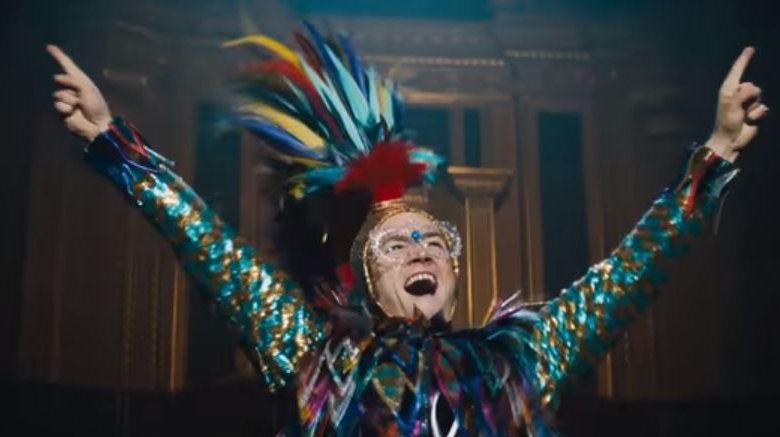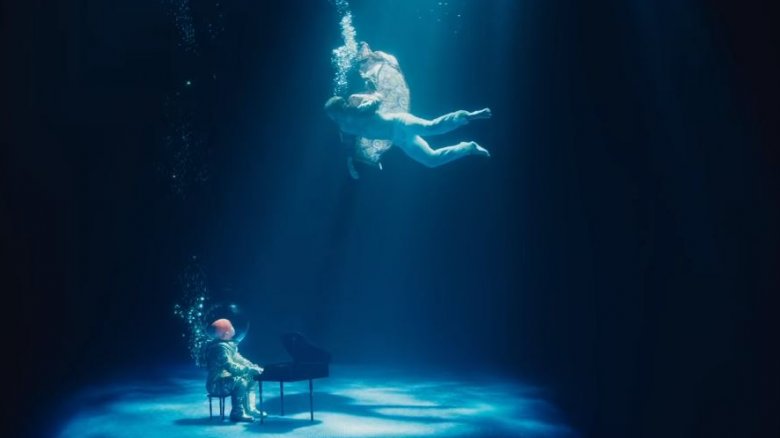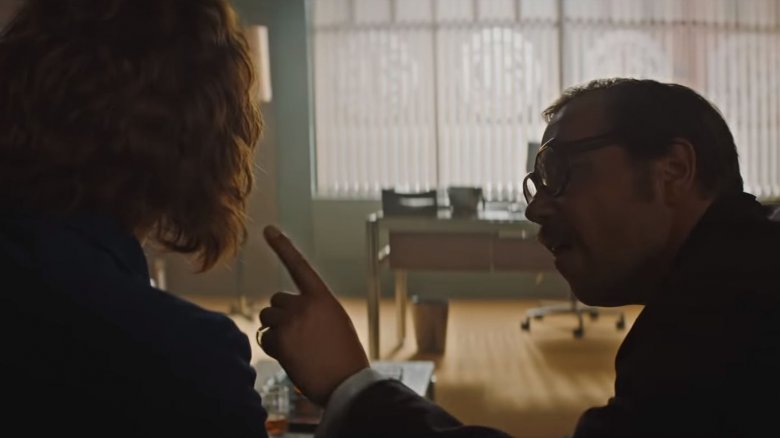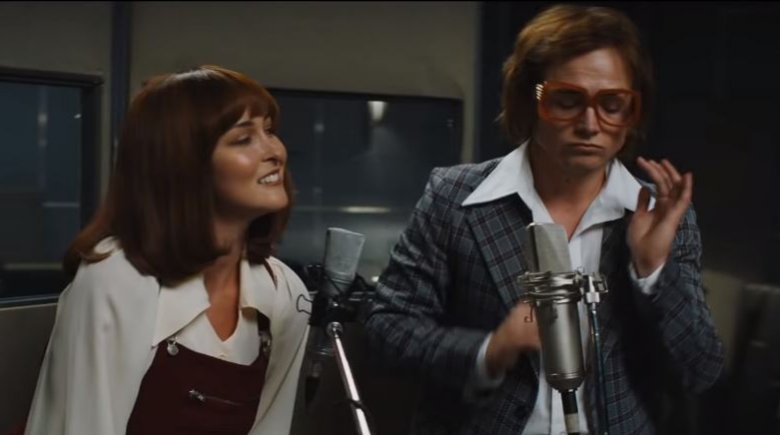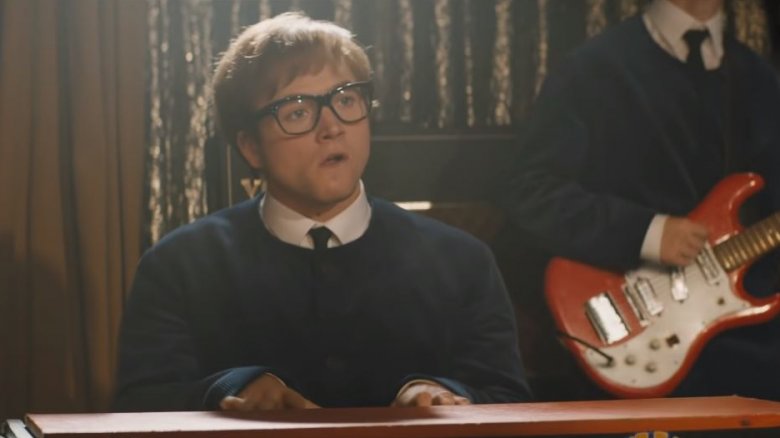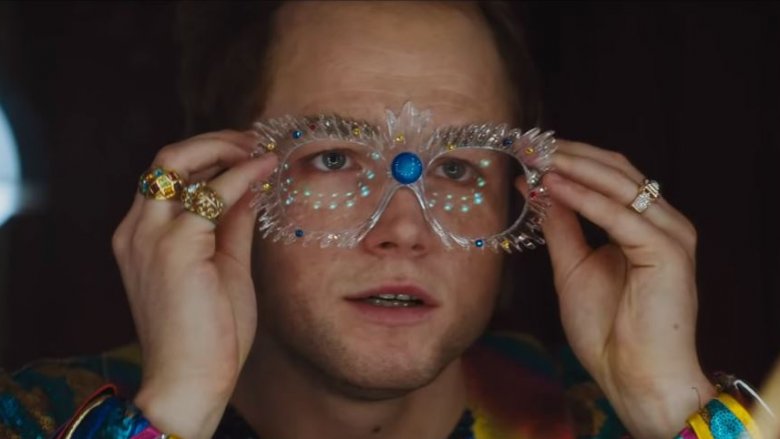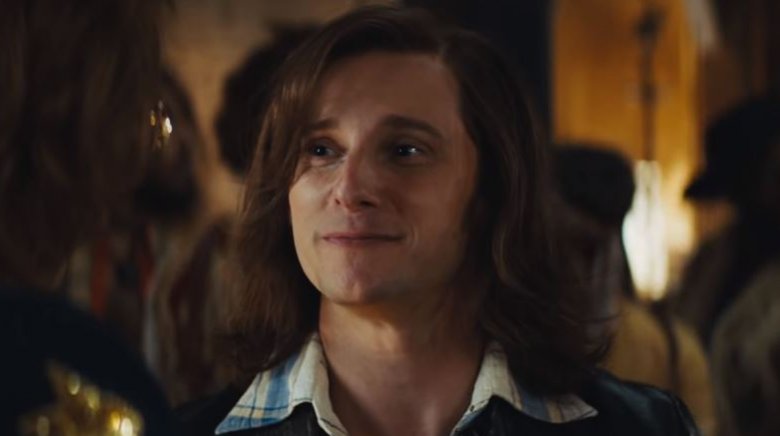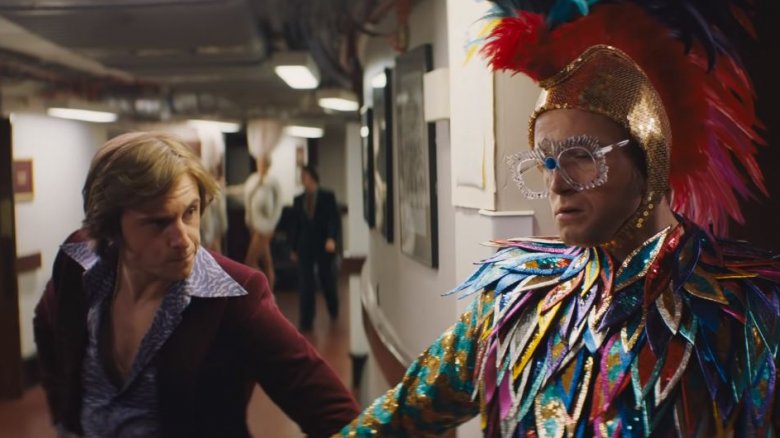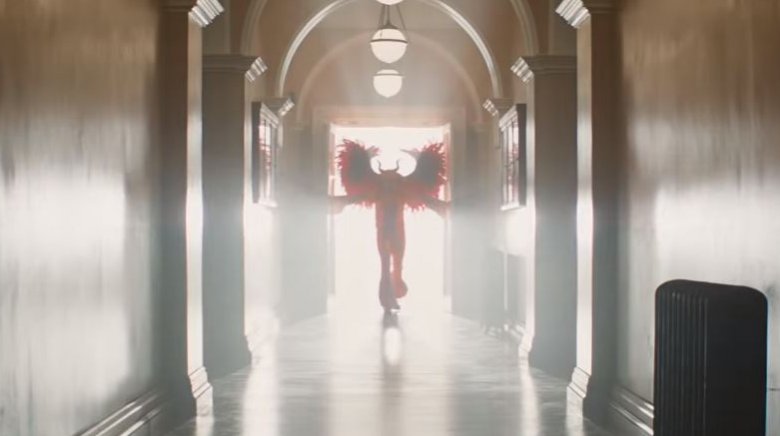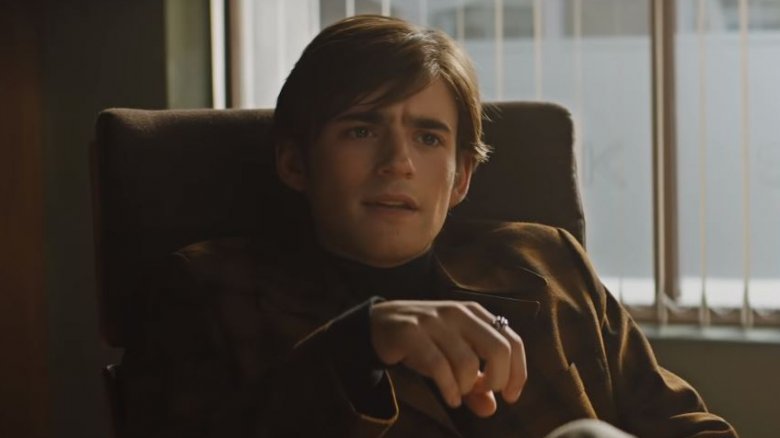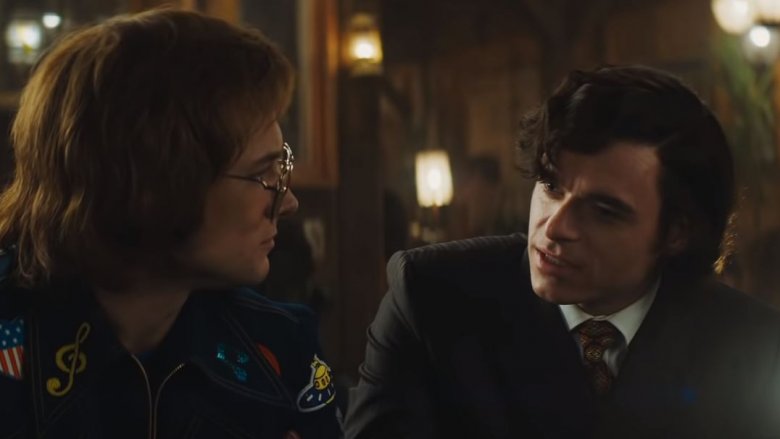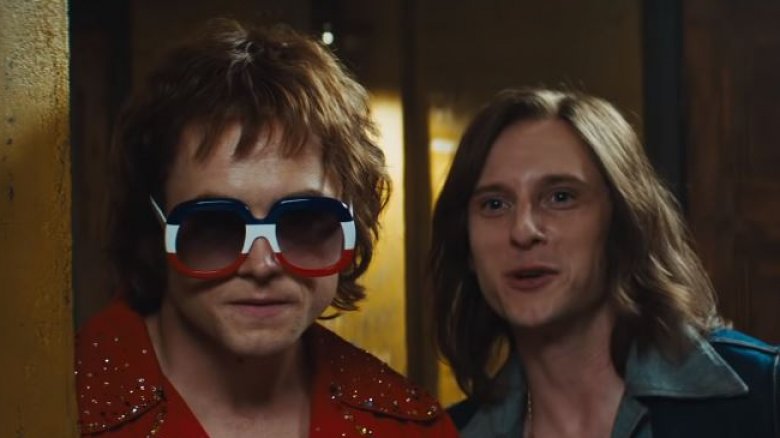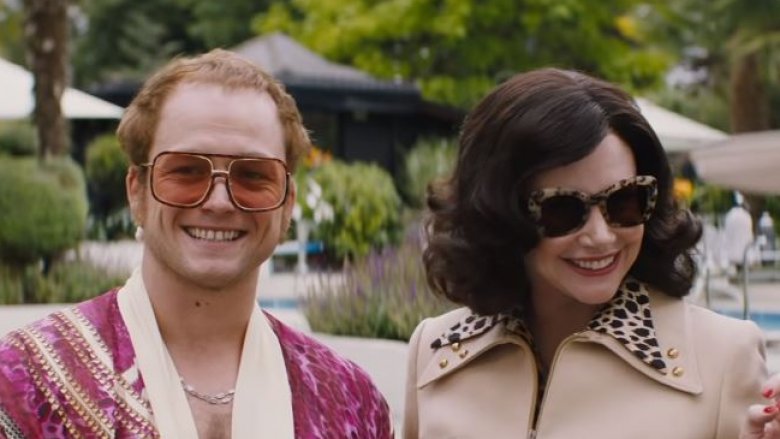12 Times Rocketman Lied To You
Rock star biopics aren't exactly known for their historical accuracy, but Rocketman avoids a lot of Bohemian Rhapsody's pitfalls by specifically setting out to be an "epic musical fantasy" that's not meant to be particularly true to life. Instead of trying to realistically portray Elton John's life between his childhood and sobriety, it opts for brushstrokes that are as broad as they come. Elaborately choreographed musical numbers drive the plot forward and portray the most important beats of John's life via song and dance, with few restraints as to how unrealistic things are going to get. Without going into details, let's just say the movie features a scene where the title is taken extremely literally.
So, yeah, decidedly not a documentary. Still, even this playful portrayal tries to tell us a story about John's life, and unfortunately that's where Rocketman often goes wrong. While by no means as egregious as the aforementioned Bohemian Rhapsody, the movie is oddly full of characters and moments that are so far removed from their real counterparts that they might as well be completely fictional. Here are 12 times Rocketman lied to you.
Obviously, spoilers ahead.
Poolside drama
One of Rocketman's most powerful moments is a scene based on Elton John's real-life 1975 suicide attempt. The movie's version has the drunk and evidently depressed John downing a handful of pills, stumbling onto the diving board of his mansion's pool, declaring that his "next trick" will be killing himself, and going limp as he falls in the water. Cue a fantastical performance of the movie's namesake tune, complete with a choreographed ambulance trip and John's hostile manager scowling at him while assuring everyone else that thing will be fine.
Elaborate underwater visions and hospital-themed dance sequences aside, this is actually a less strange reading of the real story. According to Ultimate Classic Rock, the real John theatrically announced to his friends and family, "I have taken 85 Valiums. I shall die within the hour." He then jumped in the water and "struggled to come to the surface." The aftermath of this attempt was an unceremonious stomach pumping, and to show just how sick of his antics some of his loved ones were, his grandmother (whose film incarnation is a one-dimensionally loving matron figure) commented, "I suppose we've all got to go home now." Even John himself admits this was the perfect line for the incident.
If you or anyone you know is having suicidal thoughts, please call the National Suicide Prevention Lifeline at 1-800-273-TALK (8255).
Got to have that Cockney stereotype
Rocketman portrays Elton John's early manager Dick James in a less than flattering light. The movie's James is your stereotypical Cockney thug with a nasty, rude facade that only hides more crudeness underneath. Although he ultimately displays some symptoms of a golden heart when it becomes evident that John and Bernie Taupin have some legitimately great tunes in their back pocket, he still spends the majority of his screen time insulting every other character in the room. He says that 99% of John and Taupin's output is basically garbage, celebrates successes by getting massages (that are implied to be "massages") from his secretary, and his last dialogue in the movie has him spit a nasty homophobic slur at John's new manager, John Reid.
The real Dick James, on the other hand, was pretty much everything his Rocketman counterpart is not. Billboard describes the real James as a disarmingly humble and honest man who constantly praised his associates. What's more, the people who knew the man said the secret of his success was his utmost integrity and solid principles, not to mention his considerable personal charm. His movie counterpart displays basically none of those things, and the movie even downplays his famous ear for a hit — when John tries to play some of his future classics to him, the movie version of James scoffs at each and every one of them.
Song timeline weirdness
Being essentially a musical, Rocketman plays pretty fast and loose with the timeline of its songs. Instead of placing the chronologically right Elton John song at the right moment, it opts for the dramatic route and cherry-picks the hits it feels it needs to drive the plot forward. Unfortunately, at some points this gets fairly weird and confusing. Arguably the most glaring example is the early performance of "Saturday Night's Alright for Fighting" (1973), which covers the span between Elton's childhood and early adulthood. The song ends with him rocking the house while fronting his 1960s band, Bluesology. This makes it seem like Elton was the frontman for Bluesology (as Ultimate Classic Rock will tell you, he was actually just the organist), and it's extremely easy for a casual viewer to think that "Saturday Night" was a Bluesology song.
Another particularly bad example is John's "Don't Go Breaking My Heart" duet with Kiki Dee, which is actually from 1976. However, the movie places it pretty specifically during the early stages of John's relationship with John Reid, which would be around 1970-'71. Reid literally enters the studio to prey on Elton as they're recording it. In its climax, the movie also heavily insinuates that the anthemic "I'm Still Standing" (1983) was the first song Elton wrote after getting sober in the early 1990s.
Bluesology, schmuesology
The early parts of Rocketman portray Elton John's early band Bluesology as a pub circuit act that is literally hired out of a pub corner to back up some American entertainers. They then proceed to tour England in the back of a tiny van as total, starry-eyed novices who the more experienced U.S. musicians educate on the subject of stardom.
While Ultimate Classic Rock confirms that at least some version of this tour did really happen, it's only a small part of Bluesology's story. While the Rocketman version of the band never ascended above "virtual unknowns in a tiny van" status, the real group was considerably more successful in their own right. While they never had a hit that would have propelled them to stardom, some of their songs did receive radio airplay, and they got to play some of London's biggest venues opening for acts such as the Animals and Beatles. They even got to tour Europe.
One possible reason why the movie downplays this part of Bluesology's career is that John finds the songs he wrote for them pretty dreadful. The singer calls their 1965 single "Come Back, Baby" both "cheesy" and "moronic," and says that it and "Mr. Frantic" from the same era are great examples of why he doesn't write his own lyrics.
The John in Elton John
A good few Elton John aficionados can expect a mental facepalm in the scene where Ray Williams asks John what his name is. At this point of Rocketman, our hero only has the first part of his name down, because his former bandmate Elton Dean had objected to John's attempt to steal his name verbatim. Just-Elton-So-Far quickly solves the problem when he spots a picture of the Beatles, which of course implies that the "John" comes from John Lennon.
While this means that John blew a perfect opportunity to call himself Elton Ringo, it's also patently untrue. The movie identifies the inspiration for "Elton" correctly, but The Guardian reports that the "John" actually came from Long John Baldry, a popular British rhytm and blues musician. Bluesology spent some time as a backing band for Baldry, who became something of a mentor figure to his young organist. Unfortunately, Rocketman chooses to pretend Baldry didn't exist in more ways than one. The musician once helped young John by encouraging him to get out of a hopeless early relationship with a female housemate. The movie also depicts these events, but removes Baldry from the equation, giving his role to Bernie Taupin instead.
That Taupin timeline
Rocketman quite correctly tells us that Bernie Taupin has been a constant presence in Elton John's life, but when it comes to the actual timeline of their meeting, the waters get a little muddy. Early in the movie, John experiences a rare moment of hanging out at a bar with the American musicians his band Bluesology is backing, and his writing partner and flatmate Taupin is there having some beers with the crew. When John receives some tough-love advice from the Americans who out him as gay in the process, the lyricist proves to be a loyal companion by being thoroughly unfazed and accepting.
It's a nice scene. Unfortunately, it doesn't quite fit a real-world timeline, unless someone at the table has access to a time machine. Bluesology's stint as a backup band to the Americans took place in 1965, and John didn't even meet Taupin until two years later, by which point the band was backing the extremely British Long John Baldry full time. In all fairness, though, the American musicians may be intended as composite characters that combine all the great artists Bluesology worked with. After all, that table would've had to be a good deal larger if they'd tried to fit Baldry, the Isley Brothers, Patti LaBelle and the Blue Bells, and Lee Dorsey around it.
The guys who never fight sure like to fight
Elton John and Bernie Taupin never fight. As the Irish Examiner tells us, John considers the fact that they've never had an argument an important and wondrous part of the pair's relationship, and the movie doubles down on this message by straight up stating it twice. Which is somewhat ironic, because the Rocketman versions of John and Taupin spend several scenes arguing, whining and lashing out at each other.
Though the movie goes to great lengths in portraying the duo's relationship as a friendly, brotherly one that's full of love and respect despite life's ups and downs, its definition of "not arguing" is pretty curious. In one scene, the pair clash when Taupin questions John's penchant for wearing outrageous costumes, and John retaliates by screaming in Taupin's face and storming off (though he does immediately return to apologize). Later in the movie, the two have a tense discussion about John's downward spiral of a personal life at a restaurant table, at which point it's Taupin's turn to exit in a huff, dramatically singing the thematically appropriate "Goodbye Yellow Brick Road" as he goes. While it's technically possible to avoid calling these scenes "arguments," it's only because synonyms exist.
The most difficult entrance
Rocketman starts the way it intends to keep going. In the beginning of the movie, Elton John storms into rehab wearing an elaborate, winged devil costume. The rest of the movie is told through flashbacks that he experiences during his counseling, and as the plot progresses he gradually sheds the outfit in favor of more normal clothing (yay metaphors!). As a neat twist, the costume is ultimately revealed to be his stage outfit for a major concert at Madison Square Garden. Having finally decided that enough is enough, the weary John had stormed out of the building, leaving his menagerie of handlers behind and making a beeline for a cleaner life.
Unfortunately, a narrative device is pretty much all this is. Ultimate Classic Rock reports that in reality, John's rehab was inspired by his friendship with Ryan White, a hemophiliac teen who had contracted HIV via blood transfusion. White's sickness and untimely death made John realize what a mess his life had become, and the artist says knowing White and his family was a deciding factor in his resolution to get sober.
As a cherry on top of this inaccuracy sundae, the movie doesn't even get John's costume right. According to The Guardian, the superstar did enter rehab wearing an outlandish costume ... though it was a decidedly less dramatic chicken-themed one.
A raw deal for Ray
Rocketman presents Elton John's record company guy and early personal manager Ray Williams as a wet-behind-the-ears kid who gets bullied by his boss and spends the majority of the movie as an unprofessional rookie whose defining characteristics are being a nice guy and loving a drink. When John Reid takes over, Williams sadly exits stage left to fade into obscurity. According to WUNC, the real Williams was an entirely different beast.
For one, he had already worked for a popular music TV show and as a press agent for high-profile artists like Sonny & Cher and the Kinks, so instead of the snot-nosed kid depicted in the movie, he was an industry veteran. While the movie Williams was a punk kid who met young John at a large office that actually belonged to his boss, Dick James (who promptly entered in the middle of the meeting and unleashed a barrage of sarcasm at his underling), the real man was the head of artists and repertoire for Liberty Records when John came knocking.
When John Reid takes over Elton's managerial duties, the ex-manager finishes his role in the film looking like the physical equivalent of the "sad trombone" sound, even if he briefly stops to point out that John and Reid had hanged a valuable painting upside down. The real Williams, on the other hand, went on to achieve further success as a musical supervisor for the film industry and the owner of Crumbs Music Media.
The talented Mr. Reid
Remember John Reid, the nice manager guy in Bohemian Rhapsody? The one played by Littlefinger from Game of Thrones, who the villainous Paul Prenter coldly manipulated into getting himself fired by Freddie Mercury? Well, he's getting the Prenter treatment in this one. Rocketman reimagines Reid as a suave, calculating monster who Richard Madden (another Game of Thrones alum) plays as an emotionless business beast who is half James Bond, half Bond villain. The Rocketman Reid manipulates Elton John into a relationship and becomes his personal manager, then coldly abuses, ignores, and even physically assaults the artist. When Elton attempts to break his hold, Reid coldly taunts him with ironclad contracts and absolute contempt.
As the Daily Record notes, it's true that the two were quite argumentative, and the Times mentions that Reid has been known to punch a journalist or two in his day. However, the real Reid was a small, neat man rather than a physically imposing force of evil. Although he was definitely the businessman of the duo, his relationship with Elton John was not exactly that of a struggling, abused artist and a villainous, calculating manager. Even after their five-year love affair, they had a near-symbiotic relationship for close to three decades, and they were said to resemble a married couple. While they did eventually part ways on bad terms, The Telegraph reports this was because John had started to suspect Reid was abusing his funds and took his longtime manager to court.
The dynamic duo's first songwriting steps
The Rocketman versions of Elton John and Bernie Taupin first meet in person at a cafe, where they bond over their (well, Taupin's) love of the country song "Streets of Laredo." When John starts to gush over Taupin's lyrics, the latter discovers to his horror that he had inadvertently included a text called "Border Song" in the file he'd sent to the record company. This turns out to be a fortunate coincidence, as John likes the text so much that he's already turned it into a song.
While the movie might lead you to believe that this beautiful and quite classic song was the first fruit of the songwriting duo's labors, real life rarely deals out jackpots at the first pull of the handle. The Miami Herald reveals the song John and Taupin first composed together was actually the significantly more obscure "Scarecrow" from 1967. It didn't exactly open the pearly gates for the pair, but hey, everyone needs to pay their dues.
Mommy issues
Rocketman shows Elton John's mother, Sheila Farebrother, as a complex person who straddles the line between being a mother to her boy and following her own instincts and impulses. Because of her nasty comments about John's sexuality, fame, and many personal issues, their relationship is cordial at best and strained to the point of breaking at worst. It looks like they can't avoid cutting all contact, but they eventually reconcile when John gets sober and apologizes for his behavior (via a fantasy sequence).
While those who have paid attention to gossip within the last decade may be aware that John has indeed had his share of issues with his mother, Smooth Radio notes they appear to be far more recent than the movie's timeline. The two started feuding in 2008, in the aftermath of John shuffling his organization and cutting ties with several old employees, including manager John Reid and personal assistant Bob Halley. Farebrother took offense when John asked her to sever her ties with the men as well. The petty argument escalated into an eight-year-long thing, and the two didn't reconcile until 2017 — the same year Fareweather died.
